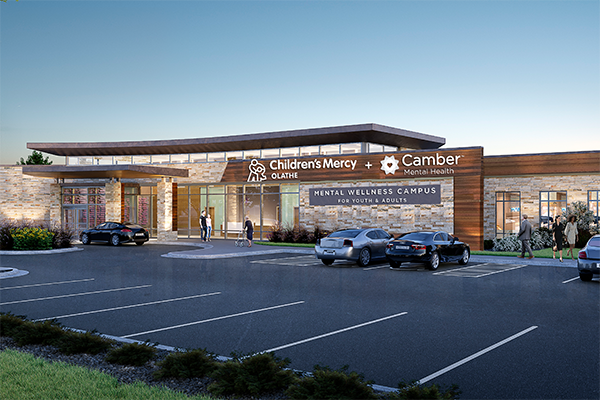Therapist Helps Teen Girls with Suicidal Thoughts Find Hope and Thrive


Janny, Therapist at Camber Children’s Mental Health
Janny is a Therapist at Camber Kansas City (previously KVC Hospitals Kansas City) where she helps kids and teens who are experiencing behavioral or mental health challenges. During our Annual Story Contest, Janny submitted inspiring success stories about some of the youth she has helped over the years. The names of these clients have been changed to protect their privacy.
My Job As A Therapist for Kids
Part of my job is empowering my clients with knowledge and resources. I do this during treatment by teaching them how to identify their symptoms and then show them the skills they can use to manage those feelings. I learn what their personal strengths are and help them apply those strengths in times of hardship and stress. We also practice managing any behaviors that may be making it difficult to overcome life’s challenges.
When it is time for a client to discharge and return home, I connect them with community resources and other supports to help them maintain stability. I transition the long-term treatment to the youth’s outpatient mental health provider while also ensuring support for the youth’s guardian throughout their transition home. I educate each child’s family and support system about their mental health and tools they can use to help them be successful at home. We also discuss the child’s preferred communication style so they can have positive and productive conversations.
 |
For Me, This Work Is Personal
Like many of our clients, I experienced mental health challenges growing up. I wish I had known more about the resources and help available. I wish I had known there was someone like who I am now who could have helped me understand what I was feeling. I enjoy helping youth achieve their goals and go on to lead happy, healthy and successful lives. I find a lot of reward in encouraging kids to be their own biggest advocates.
There are so many clients who have left a lasting impact on my life. Sharing some of their stories is a way I can show the importance of this work and how it makes a difference in people’s lives. Educating and supporting my client’s families is a big part of treatment and the client’s success. I feel proud when I help the whole family unit grow stronger, feel new hope, communicate better and support one another.
Helping Daughter and Mom Reconnect
I worked with a teen girl named Laura who was admitted to our psychiatric hospital because she was having suicidal thoughts. Laura felt hopeless and overwhelmed in life. When we first started treatment, we spent a lot of time talking about her strengths. I focused on reinforcing her self-worth and helping her develop problem-solving skills.
During family therapy, I noticed that Laura’s mom sometimes became defensive and used negative words to describe her daughter. She would say that she didn’t think Laura would amount to anything if she didn’t finish school. Just as important as it was for Laura to believe in her own worth, I also helped her mom understand how her words affected Laura’s opinion of herself. We talked about self-esteem and how to positively communicate with one another. This helped create a supportive relationship and Laura found increased trust with her mom.
After our third family therapy session, Laura’s mom felt comfortable expressing her own feelings. She used positive words to describe how she felt about Laura and often told her that she loved her. She showed Laura that she just wanted what was best for her. Laura’s mom also explained to her that she hoped she’d finish school for the education and that she would love her no matter what. Hearing this from her mom helped Laura feel safe and connected, which every child needs.
Throughout individual and family therapy, Laura came to realize that what she was needing most was her mom’s attention, support and love. She wanted the chance to create happy memories together. They needed to find more positive ways to communicate with one another. When Laura left Camber, she was no longer having suicidal thoughts. She and her mom continued working on improving their relationship, including attending family therapy with a therapist in their community. Being able to help mom and daughter develop a stronger bond built on love and support was a very rewarding experience.
Advocating for LGBTQIA+ Youth
 I feel particularly proud of my work with LGBTQIA+ youth and helping them connect to supports that help them feel confident being who they were born to be. Educating parents is a big part of my work when helping LGBTQIA+ youth. This includes providing resources and emotional support for parents to help them create a safe space for their child.
I feel particularly proud of my work with LGBTQIA+ youth and helping them connect to supports that help them feel confident being who they were born to be. Educating parents is a big part of my work when helping LGBTQIA+ youth. This includes providing resources and emotional support for parents to help them create a safe space for their child.
I once worked with an adolescent girl named Emily who was receiving treatment in our hospital. Emily was depressed, having suicidal thoughts, and exhibiting disruptive behavior.
Emily had recently told her dad that she was gay, after this, he struggled with their relationship. When Emily and I had individual therapy sessions, we talked about her relationship with her dad. We talked about her feelings toward her dad and how his words affected her. I taught her coping mechanisms to help her identify triggers that caused her to feel dysregulated and also taught her how to regulate her emotions when she felt herself becoming upset.
Emily’s father showed great support for his daughter and visited her almost every day. During family therapy, I worked with him to identify the reasons he and Emily were struggling to connect. He began to realize how impactful sharing his feelings could be. Emily was able to express what support she needed from her dad and her dad was able to reciprocate this. He confessed how much he loves his daughter and how much he doesn’t want her to die. After Emily discharged and went home, she and her father set up individual and family therapy with their community mental health center. Emily and her father are doing well and continuing to develop a supportive and loving relationship.
About Camber Children’s Mental Health
Camber Children’s Mental Health (previously KVC Hospitals) is a nonprofit network of children’s psychiatric hospitals and residential treatment facilities serving Kansas and Missouri. Each year, we serve thousands of youth ages 6 to 18 who are experiencing depression, anxiety, suicidal thoughts, the impacts of childhood trauma, and other behavioral and mental health needs. Our compassionate team uses neuroscience-based treatment resources regarding how stress and trauma impact brain development. They turn this science into hands-on tools that guide successful treatment outcomes.






